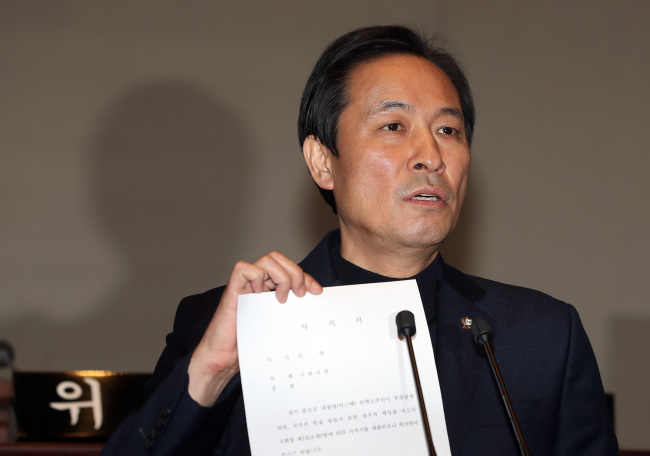Even if the impeachment motion is approved Friday, the nation’s fight to bring an end to the Park Geun-hye presidency would still face a rough ride, with a lengthy legal battle expected at the Constitutional Court.
The motion’s passage would immediately suspend the disgraced president from her duties. But that would only be the beginning, as Park refuses to step down on her own and is seen as gearing up to defend her innocence in court.
With six months given to the constitutional justices to deliberate the motion, concerns are spiraling over uncertainties and a subsequent vacuum in statecraft. Worrying signs are rampant in almost every sphere of the economy, top-level diplomacy is at a standstill and speculation is rising that North Korea may stage a major provocation in the near future.
Opposition parties are calling for Park to resign immediately if the bill is passed, despite varying interpretations on the move’s constitutionality.
 |
(Yonhap) |
Rep. Woo Sang-ho, floor leader of the main opposition Democratic Party of Korea, has expressed the willingness to negotiate with the ruling Saenuri Party on the timetable of the president’s exit following the Friday vote.
“She must step down upon the impeachment vote without a word,” the party’s former chief Moon Jae-in wrote on his Facebook page last Saturday.
“Though constitutional scholars remain divided on that matter, the dominant opinion is that she can. If she resigns before the Constitutional Court begins its deliberation, it would quickly complete the impeachment procedure.”
But former Saenuri Party head Rep. Kim Moo-sung rebuffed the idea as “anti-constitutional,” saying the court has the authority to make a final decision and accused Moon of flaunting his ambition to take advantage of a possible early election as a leading opposition contender.
Incumbent Saenuri Party chair Lee Jung-hyun also said Wednesday that even if the motion is voted down, the president should publicly declare she will leave in April as she indicated to him a day before.
“The forthcoming impeachment poses a choice between an orderly departure and a forced one,” Lee said in a press interview.
“It’s a choice between whether we would go according to the plan under which she resigns in April and an election is held in June, followed by a constitutional amendment, or we would confront the severe chaos due to an unpredictable constitutional deliberation and election schedule.”
Park, however, has made clear that she is ready to follow the court process “in a calm and composed manner,” rather than leave Cheong Wa Dae through resignation.
Controversy also persists over the text and language of the bill, with pro-Park Saenuri lawmakers, including Lee and some experts, arguing it included a multitude of unverified or relatively irrelevant allegations and thus would require more time for the justices to corroborate.
Another focal point is whether to let Prime Minister Hwang Kyo-ahn govern as acting president until the next election or appoint someone else and form a neutral Cabinet.
The Constitution rules that the premier would take the reins in case of the president’s impeachment.
Democratic Party Chairwoman Rep. Choo Mi-ae has said the National Assembly shout nominate a new prime minister to replace Hwang.
But others deem the proposal as idealistic or beyond the parliament’s powers, calling instead for ousting Hwang before the impeachment vote.
With the Constitution lacking specific clauses on the acting president’s authority, Hwang’s role is forecast to deepen the dispute not only between the ruling and opposition sides, but also inside each camp.
It is also likely to have an impact on Park’s impeachment as two constitutional justices are scheduled to retire in January and March, which means that, if they are not replaced, the motion would require the approval of six of the remaining seven justices.
By Shin Hyon-hee (
heeshin@heraldcorp.com)





![[Exclusive] Hyundai Mobis eyes closer ties with BYD](http://res.heraldm.com/phpwas/restmb_idxmake.php?idx=644&simg=/content/image/2024/11/25/20241125050044_0.jpg)
![[Herald Review] 'Gangnam B-Side' combines social realism with masterful suspense, performance](http://res.heraldm.com/phpwas/restmb_idxmake.php?idx=644&simg=/content/image/2024/11/25/20241125050072_0.jpg)

